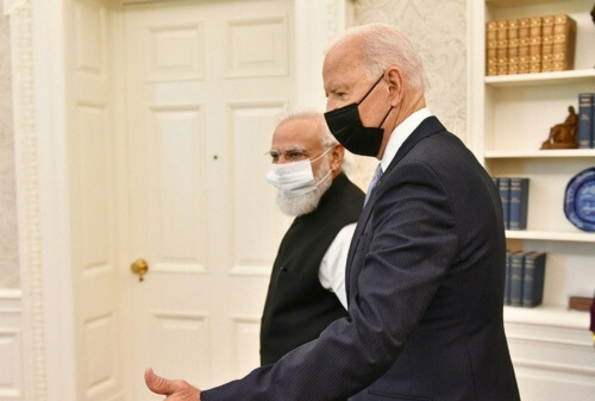Support for Hindu nationalism is widespread in the western diaspora, which both ends of the American political spectrum enable, in their own ways.
Last week, American journalists reported on Indian Prime Minister Narendra Modi’s extravagant Washington welcome by the Biden administration with fascination, bemusement, and concern. The New York Times reported on the guest list for the state dinner, as well as Modi’s participation in a yoga session at the United Nations. Others focused on the prospect of a US-Indian alliance in opposition to China. However, there’s a far more complex story to be told here about the religious dimensions of the Modi-Biden (and by extension, India-US) relationship. This is a story that demands attention from scholars of American religions, Hinduism, and Islam, traditions not often considered together but whose mutual imbrications have shaped one another historically and ever more so today. The globalized religious politics swirling around the Modi state visit in particular and US-India relations more generally have generated troubling connections between two strains of right-wing extremists: white Christian nationalism and Hindu nationalism, or Hindutva, of which Modi’s Bharatiya Janata Party (BJP) government is the leading proponent. A fundamental stance that both defines these groups and brings them together is their virulent Islamophobia.
Thus, an unsettling contradiction around the Modi visit occasionally cropped up in the coverage: how could Biden, who pledged to re-center human rights in American foreign policy, give such a lavish and legitimizing embrace to Modi, whose Hindu Nationalist politics and record of anti-Muslim violence led to his ban from the US in 2005? Modi’s increasingly authoritarian crackdowns on freedom of speech and the press have human rights watchdogs deeply concerned about the future of democracy in India. At least some members of Congress boycotted Modi’s speech to the special joint session on the basis of these concerns. As Maya Jasanoff, professor of history at Harvard, put it in a recent op-ed, “armed with a sharp-edged doctrine of Hindu nationalism, Mr. Modi has presided over the nation’s broadest assault on democracy, civil society, and minority rights in at least 40 years.”
While the Biden administration is eager to demonstrate its distance from Trump-era policies in some ways, its solicitation of Modi is not among them. Consider American media coverage of an event called “Howdy, Modi!” in Houston, Texas, a joint political rally for Trump and Modi in the run-up to the 2020 presidential election. American journalists told a fascinating, if straightforward story: nationalists of a feather fly together. Trump and Modi filled a stadium with a 50,000-person crowd of mostly South Asian Americans and their thunderous applause. The scene encapsulated how much a supremacist project like Trump’s white Christian nationalism and Modi’s Hindutva, or masculine Hindu nationalism, had in common.
In the post-9/11 era, the specter of terrorism has been leveraged by Republicans and Democrats alike to pass damaging policies like Trump’s infamous “Muslim Ban,” “Countering Violent Extremism” or CVE programs, and continued violence overseas towards Muslim communities caught at the wrong end of American empire. In India, similar approaches have seriously escalated in the past few years, from an amendment essentially creating a religious test for Indian citizenship, to vigilante violence in the name of “cow protection” or preventing “love jihad,” to bulldozing Muslim homes and businesses, to literally erasing India’s Muslim history from school textbooks. In neither the US nor India is Islamophobic rhetoric purely rhetorical—it results in very real, and in India often quite public, violence. The threat of anti-Muslim genocide in India has been identified as increasingly likely.
This kind of dangerous rhetoric is hardly limited to India, either—last year, anti-Muslim symbols appeared at a community parade in Edison, New Jersey, and violence broke out between Hindu and Muslim communities in Leicester, England. Around the global Hindu diaspora, there is widespread support for Hindutva (lit. “Hindu-ness”), the political ideology of India as essentially and eternally a Hindu nation, to the exclusion of other religions, mostly (but not exclusively) Islam. This should not surprise scholars of religion and globalization. Religious diasporas—Jewish, Hindu, Muslim, Buddhist—very often become strong supporters of religious nationalism back in the homeland, usually nostalgically romanticized as a place where traditions are dominant and pure. In the last decade, the South Asian population in the US has grown to about three million, or one percent of the country’s population. At the same time, Hindu Americans (not to be conflated with South Asian Americans) have become key economic, political, and religious supporters for Hindutva in India.
American liberals, including Biden Democrats, may unwittingly support such diasporic religious nationalism. American multicultural approaches to religious diversity, popular among liberals, can often platform Hindu nationalist sympathizers. The sociologist of religion Prema Kurien has argued that American multiculturalism expects each culture or religion to put forward spokesmen (and they usually are men) to represent their perspective. The trouble is, of course, that all religions contain tremendous internal diversity, and Hinduism particularly so, with no founder, single scripture or text, single deity, or so forth. However, American public discourse is allergic to nuance, and “model minority” politics still runs amok. So even well-intentioned advocates of multiculturalism seek a figurehead for American Hindus, which amplifies the voices of Hindu Nationalists and their religious sympathizers, the main group attempting to unify and standardize Hinduism globally. The embrace of Hindu identity as grounds for activism by Hindutva groups in the US can contribute to a sense of pride and belonging for Hindu Americans in a culture often hostile to non-Christian faiths, but at the cost of promoting violence against religious minorities in South Asia and beyond.
Modi’s rhetoric during his White House visit gestured toward this affinity with an anti-colonial veneer. He celebrated in his speech to Congress that India, for the first time in one thousand years, was free of “foreign rule.” The reference here was not only to British imperialism, whose presence in the subcontinent in the form of the East India Company began in the mid-eighteenth century, but to the Mughal Empire and the Delhi Sultanate, Islamic empires that ruled over swaths of South Asia from the thirteenth to the mid-nineteenth centuries. The phrase “foreign rule” does a lot of work here: conflating a post-colonial critique with a common Islamophobic trope in India that understands Indian Muslims as “foreign” (i.e., with origins and sympathies lying outside of and against the Indian state), and oppressive (i.e., a threat to Hindus). This kind of religious chauvinism masquerading as anti-colonial advocacy has unfortunately gained traction to a certain extent in the US, with “Hinduphobia” claimed as a response to activists working for Dalit rights (those outside of the caste system), women’s, and queer rights among North American and global Hindus. Even a recent academic conference on Hindu nationalism was targeted for harassment and subjected to violent threats.
Support for Hindu nationalism is widespread in the western diaspora, which both ends of the American political spectrum enable, in their own ways. The Trump Republicans get there through Islamophobic nationalism, and Biden
Democrats get there through multiculturalism and diplomacy. From a religious studies perspective, we should not be surprised when globalization creates strange religio-political bedfellows.
Francesca Chubb-Confer is a Visiting Assistant Professor of Religion at Whitman College, and a scholar of Islam in South Asia.
Andrew Kunze is a scholar of contemporary Hinduism and mass media whose work is interested in the intersections of technological labor and theological power.
Source: www.divinity.uchicago.edu


